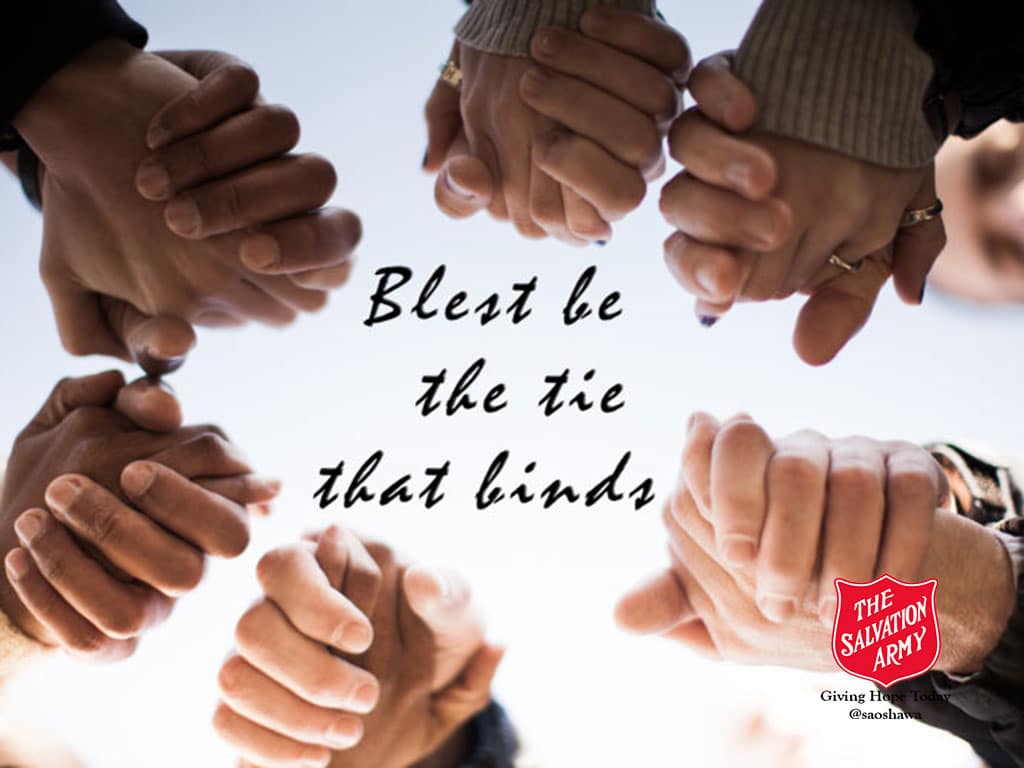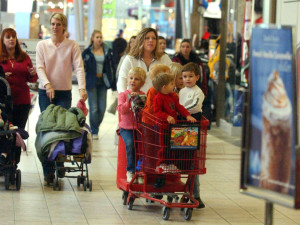Blest be the tie that binds
Our hearts in Christian love;
The fellowship of kindred minds
Is like to that above.
Before our Father’s throne
We pour our ardent prayers;
Our fears, our hopes, our aims are one,
Our comforts and our cares.
We share our mutual woes,
Our mutual burdens bear;
And often for each other flows
The sympathizing tear.
When we asunder part,
It gives us inward pain,
But we shall still be joined in heart
And hope to meet again.
From sorrow, toil and pain
And sin we shall be free;
And perfect love and friendship reign
Through all eternity.
This song can be used as a benediction or as a farewell when a church member is moving away, because it promotes the special bond of kinship that Christians share, and asks God to bless that. It reminds us of the sincere empathy that should exist as we share our joys and sorrows. It’s important, too, that we each make ourselves vulnerable and able to share our weaknesses – not pretend that we are always coping perfectly. Jesus said, “By this all will know that you are my disciples – if you love one another.” (John 13:35)
 Author John Fawcett lived in Yorkshire, England, from 1740 to 1817. He was orphaned at age twelve and sent to work long hours for a tailor. He came to accept Christ through the preaching of evangelist George Whitefield, joining the Baptist church. At the age of twenty-three Fawcett became a minister at Wainsgate, a very small village near Hebden Bridge. Most of his congregation were poor, illiterate, rough-spoken farmers and shepherds, who had been bypassed by the established churches. The Baptists were the ones who sent an itinerant young preacher to them. No doubt if the Salvation Army had existed then, an officer would have been appointed there, too!
Author John Fawcett lived in Yorkshire, England, from 1740 to 1817. He was orphaned at age twelve and sent to work long hours for a tailor. He came to accept Christ through the preaching of evangelist George Whitefield, joining the Baptist church. At the age of twenty-three Fawcett became a minister at Wainsgate, a very small village near Hebden Bridge. Most of his congregation were poor, illiterate, rough-spoken farmers and shepherds, who had been bypassed by the established churches. The Baptists were the ones who sent an itinerant young preacher to them. No doubt if the Salvation Army had existed then, an officer would have been appointed there, too!
John Fawcett and his wife, Mary, went to live in the village and had four children. They existed on a meagre salary, supplemented by goods donated by the parishioners. They visited people’s homes and eventually built up their congregation so that a balcony had to be added to the small church. Later, another chapel was built for them at Hebden Bridge. When invited to take on a larger church in London, the Fawcetts declined, preferring to stay with the people they had nurtured for many years. They also added a structure to their home so that the children of the area could be educated. John Fawcett was known as a scholar and an educator, as well as a preacher. He founded the Northern Education Society, which became Rawdon College. John had some of his devotional writings published, and was granted an honorary Doctorate of Divinity by Brown University, Providence, Rhode Island. The Fawcetts ministered at Wainsgate and Hebden Bridge combined for fifty-four years.
They visited people's homes and eventually built up their congregation Share on XWORDS: JOHN FAWCETT; MUSIC, TUNE – DENNIS: LOWELL MASON
S.A. SONG BOOK, 1987 EDITION, # 660; 2015 EDITION, #812
REFERENCE: WIKIPEDIA
One Song – Blest Be The Tie That Binds
Four Styles: Southern Gospel, Bluegrass, Modern Worship, Traditional Gospel






